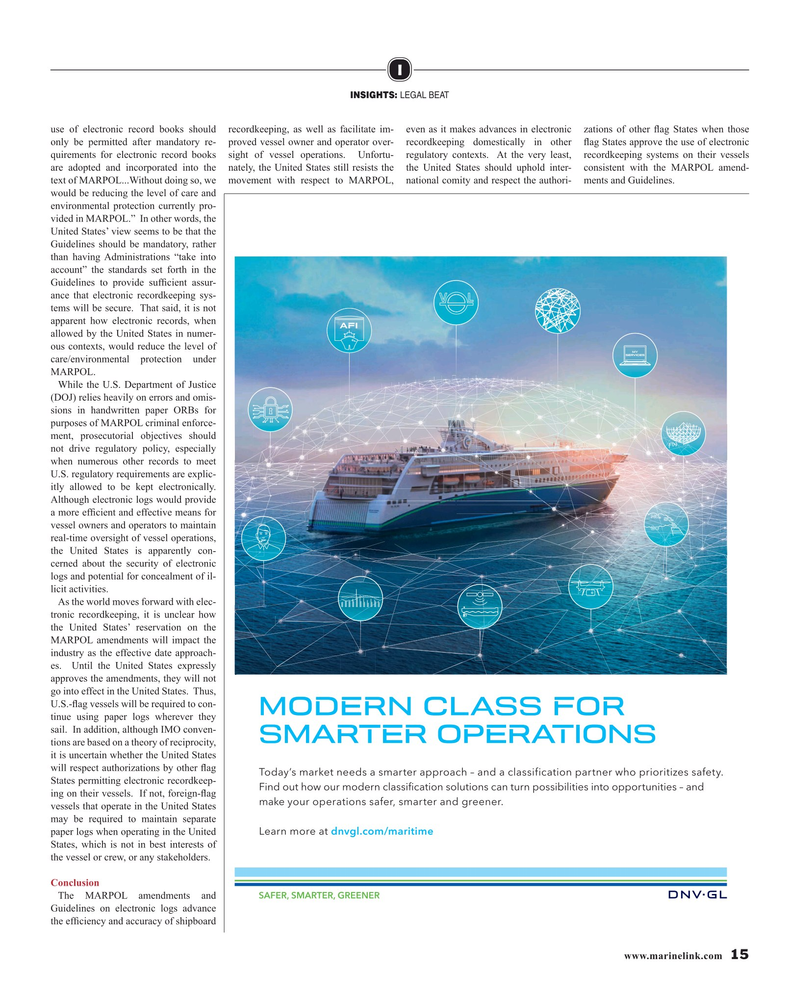
Page 15: of Maritime Reporter Magazine (October 2019)
Marine Design Annual
Read this page in Pdf, Flash or Html5 edition of October 2019 Maritime Reporter Magazine
I
INSIGHTS: LEGAL BEAT use of electronic record books should recordkeeping, as well as facilitate im- even as it makes advances in electronic zations of other ? ag States when those only be permitted after mandatory re- proved vessel owner and operator over- recordkeeping domestically in other ? ag States approve the use of electronic quirements for electronic record books sight of vessel operations. Unfortu- regulatory contexts. At the very least, recordkeeping systems on their vessels are adopted and incorporated into the nately, the United States still resists the the United States should uphold inter- consistent with the MARPOL amend- text of MARPOL...Without doing so, we movement with respect to MARPOL, national comity and respect the authori- ments and Guidelines.
would be reducing the level of care and environmental protection currently pro- vided in MARPOL.” In other words, the
United States’ view seems to be that the
Guidelines should be mandatory, rather than having Administrations “take into account” the standards set forth in the
Guidelines to provide suf? cient assur- ance that electronic recordkeeping sys- tems will be secure. That said, it is not apparent how electronic records, when allowed by the United States in numer- ous contexts, would reduce the level of care/environmental protection under
MARPOL.
While the U.S. Department of Justice (DOJ) relies heavily on errors and omis- sions in handwritten paper ORBs for purposes of MARPOL criminal enforce- ment, prosecutorial objectives should not drive regulatory policy, especially when numerous other records to meet
U.S. regulatory requirements are explic- itly allowed to be kept electronically.
Although electronic logs would provide a more ef? cient and effective means for vessel owners and operators to maintain real-time oversight of vessel operations, the United States is apparently con- cerned about the security of electronic logs and potential for concealment of il- licit activities.
As the world moves forward with elec- tronic recordkeeping, it is unclear how the United States’ reservation on the
MARPOL amendments will impact the industry as the effective date approach- es. Until the United States expressly approves the amendments, they will not go into effect in the United States. Thus,
U.S.-? ag vessels will be required to con-
MODERN CLASS FOR tinue using paper logs wherever they sail. In addition, although IMO conven-
SMARTER OPERATIONS tions are based on a theory of reciprocity, it is uncertain whether the United States will respect authorizations by other ? ag
Today’s market needs a smarter approach – and a classification partner who prioritizes safety.
States permitting electronic recordkeep-
Find out how our modern classi?cation solutions can turn possibilities into opportunities – and ing on their vessels. If not, foreign-? ag make your operations safer, smarter and greener.
vessels that operate in the United States may be required to maintain separate
Learn more at dnvgl.com/maritime paper logs when operating in the United
States, which is not in best interests of the vessel or crew, or any stakeholders.
Conclusion
The MARPOL amendments and
Guidelines on electronic logs advance the ef? ciency and accuracy of shipboard www.marinelink.com 15
MR #10 (10-17).indd 15 10/4/2019 2:40:39 PM

 14
14

 16
16
